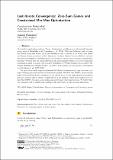Last-iterate convergence: Zero-sum games and constrained min-max optimization
Author(s)
Daskalakis, C; Panageas, I
DownloadPublished version (631.4Kb)
Publisher with Creative Commons License
Publisher with Creative Commons License
Creative Commons Attribution
Terms of use
Metadata
Show full item recordAbstract
© Constantinos Daskalakis and Ioannis Panageas. Motivated by applications in Game Theory, Optimization, and Generative Adversarial Networks, recent work of Daskalakis et al [Daskalakis et al., ICLR, 2018] and follow-up work of Liang and Stokes [Liang and Stokes, 2018] have established that a variant of the widely used Gradient Descent/Ascent procedure, called “Optimistic Gradient Descent/Ascent (OGDA)”, exhibits last-iterate convergence to saddle points in unconstrained convex-concave min-max optimization problems. We show that the same holds true in the more general problem of constrained min-max optimization under a variant of the no-regret Multiplicative-Weights-Update method called “Optimistic Multiplicative-Weights Update (OMWU)”. This answers an open question of Syrgkanis et al [Syrgkanis et al., NIPS, 2015]. The proof of our result requires fundamentally different techniques from those that exist in no-regret learning literature and the aforementioned papers. We show that OMWU monotonically improves the Kullback-Leibler divergence of the current iterate to the (appropriately normalized) min-max solution until it enters a neighborhood of the solution. Inside that neighborhood we show that OMWU becomes a contracting map converging to the exact solution. We believe that our techniques will be useful in the analysis of the last iterate of other learning algorithms.
Date issued
2019-01-01Department
Massachusetts Institute of Technology. Computer Science and Artificial Intelligence LaboratoryJournal
Leibniz International Proceedings in Informatics, LIPIcs
Citation
Daskalakis, C and Panageas, I. 2019. "Last-iterate convergence: Zero-sum games and constrained min-max optimization." Leibniz International Proceedings in Informatics, LIPIcs, 124.
Version: Final published version